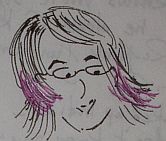 So smart and engaging is Jennifer Michael Hecht’s Doubt: A History that it’ll be twice as thick and cumbersome to lug around once I’m finished reading. I keep turning down the bottom corner of every other page.
So smart and engaging is Jennifer Michael Hecht’s Doubt: A History that it’ll be twice as thick and cumbersome to lug around once I’m finished reading. I keep turning down the bottom corner of every other page.
James Hynes, an atheist and fellow fan of Twain’s Letters from the Earth, calls the book a “wonderful popular history of skepticism, from the Greeks to the present.”
It’s elegant, witty, and very light on its feet, with none of the arrogance, self-righteousness, or snarkiness of the New Atheists (Harris, Dawkins, Hitchens, etc.). I learned a lot, and now, thanks to Ms. Hecht, I have purchased a small library of classics of skepticism (by Epicurus, Cicero, Spinoza, Thomas Paine, and David Hume) that I’m working through, books I should have read as a philosophy major years ago, but didn’t.
I’m already having similar library-amassing impulses — an unfortunate development, given that the Maud household will soon be moving.
Not only is Hecht insightful on the tradition of doubt in ancient Greece, but chapter 2, “Smacking the Temple: Doubt and the Ancient Jews,” conjures the Alexandria of 300 BCE so vividly and with such nuance that it feels more like a modern-day cosmopolis than a place you’d read about in the history books.
Because I grew up reading the Bible in fundamentalist Christian schools and churches, it hadn’t occurred to me to applaud or even wonder much about the lives of the secular (i.e. sinful, idol-worshipping, deserving of God’s wrath, etc., etc.) Jews that the Old Testament prophets are always railing against. Hecht is excellent on the subject, thoughtfully exploring the split between the culturally Hellenic Jews and their more dutifully observant brethren, and considering the impact of Greek culture on Jewish thought.
The secularist Jewish community began to see the empire and the Greek philosophical tradition as a significant part of their identity…. The ever-changing world seemed headed toward more integration, more trade, more shared knowledge. Some Jews, welcoming those trends, relaxed their observance of traditional law, which now seemed isolating, awkward, or irrelevant. In an ironic twist quite common in the history of doubt, it was often the children of the old elite priestly class who were the most enthusiastic defenders of the new secular culture.
But above all (says the woman who’s on page 87 of 551), the book is worth reading for its examination of the different but equally powerful strains of doubt in my two favorite Old Testament books: Job (which is, as Hecht says, not quite the simple story of faith and divine justice the devout make it out to be — “In God’s world, Job accuses, the vicious get away with everything”), and the heretical, poetic, and highly entertaining Ecclesiastes.
Caricature of Hecht swiped from Old Flutes.